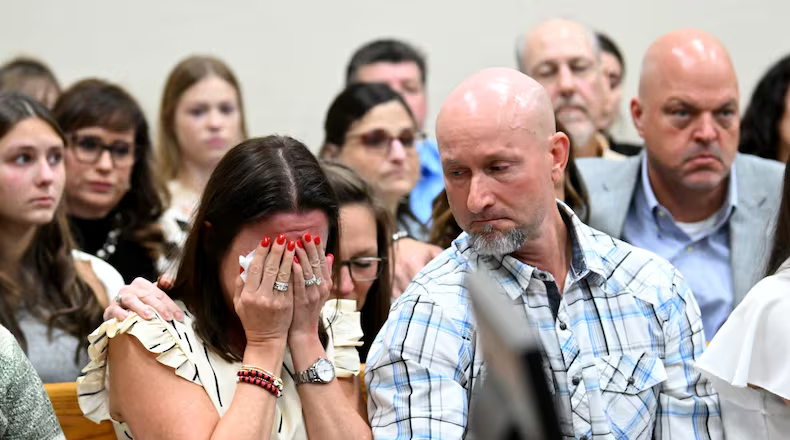Introduction: The Case of Laken Riley
Brief Overview
Laken Riley’s story is one that has shaken hearts across the nation. On February 22, 2024, this 22-year-old nursing student from Augusta University lost her life in a brutal attack while jogging on the University of Georgia campus in Athens. What should have been a routine activity turned into a tragedy, leaving her family, friends, and community grieving—and demanding justice.
The trial of Jose Ibarra, the man accused of her murder, has finally begun, and it has reignited conversations about campus safety, immigration laws, and the justice system. Ibarra, an undocumented migrant from Venezuela, faces charges that paint a harrowing picture of a premeditated act of violence. Prosecutors claim Laken fought valiantly for her life—a testament to her resilience and strength.
Significance of the Case
This case is more than a legal battle; it has become a symbol of wider societal issues. For students, it highlights concerns about safety on campus, especially for women. For policymakers, it underscores debates around immigration enforcement and public safety. And for the broader public, it’s a chilling reminder of how lives can change in an instant.
I remember walking through a similar campus during my university years, feeling carefree but always carrying a small can of pepper spray—just in case. Reading about Laken’s story brought back that old unease, a reminder of how vulnerable we can be in spaces that are supposed to feel safe. It also reminded me of the importance of community vigilance and proactive measures to protect one another.
Who Was Laken Riley?
Personal Background
Laken Riley was a vibrant 22-year-old nursing student at Augusta University, pursuing her dream of becoming a healthcare professional. Known for her determination and kindness, she was deeply involved in her studies and excelled academically. Her passion for nursing stemmed from a desire to help others, a trait she demonstrated throughout her life.
At Augusta University, Laken was admired by classmates and professors alike. She balanced her rigorous coursework with a love for outdoor activities, including jogging—a hobby that gave her a sense of peace amidst her demanding schedule.
Life at Augusta University
As a nursing student, Laken embodied compassion and perseverance. Her professors often described her as a hard-working individual who brought a positive energy to every room she entered. She participated in student-led initiatives, volunteered at local healthcare events, and was on her way to becoming a trusted healthcare provider. Her peers remember her as a supportive friend who always had an encouraging word to share.
Community Impact
Laken wasn’t just a dedicated student—she was a cherished member of her community. Whether she was tutoring younger students or helping at local shelters, she made a difference wherever she went. After her untimely death, her community gathered to honor her legacy through vigils and fundraisers, keeping her spirit alive through acts of kindness.
Family and friends shared heartfelt tributes, recalling her bright smile, unwavering determination, and ability to make people feel cared for. Laken left an indelible mark on everyone she met, inspiring others to lead with kindness and courage.
The Incident: February 22, 2024
Details of the Crime
On February 22, 2024, what began as a routine jog turned into a tragedy. Laken was jogging along a familiar trail on the University of Georgia campus in Athens when she was attacked. The wooded area, often bustling with students and joggers, became the scene of a heinous crime.
Authorities revealed that Laken was ambushed in broad daylight, making the attack all the more shocking. Evidence suggests she fought valiantly against her attacker, a testament to her strength and resilience.
Location: University of Georgia Campus
The incident occurred near a popular jogging path close to campus housing, a spot considered safe by many students. The area is bordered by trees and pathways, often filled with students unwinding after classes. The attack shattered the sense of security in the community, leaving residents and students reeling.
Discovery of the Body
Laken’s body was discovered later that day after concerned friends and family reported her missing. Her roommate, alarmed when Laken didn’t return home, used a phone tracking app to locate her last known position. This led authorities to the wooded area where her lifeless body was found.
The scene was grim: investigators described finding evidence of a violent struggle. Her belongings were scattered, and her injuries indicated the attack’s brutality.
Initial Reactions from the Community and Authorities
News of Laken’s death sent shockwaves through the university and the surrounding community. Vigils were held almost immediately, with students, staff, and local residents coming together to mourn her loss. Law enforcement launched an intensive investigation, determined to bring justice to her grieving family.
The incident not only highlighted the importance of campus safety but also united the community in a shared commitment to prevent such tragedies in the future.

The Accused: Jose Ibarra
Background Information
Jose Antonio Ibarra, the accused in the murder of Laken Riley, is a 28-year-old undocumented migrant from Venezuela. According to immigration records, Ibarra entered the U.S. without authorization, highlighting broader debates about immigration policies and border security. Authorities described him as living in the shadows, moving between jobs without stable residency.
The circumstances leading to his arrest were chilling. Surveillance footage showed a man, identified as Ibarra, disposing of items later linked to the crime, including bloody clothing and a rock believed to be the murder weapon. Witness accounts and location data placed him near the crime scene on the night Riley disappeared.
Alleged Motives
Prosecutors allege that Ibarra was “hunting for women,” a term used in their opening statements to describe his predatory behavior. They claim he targeted Riley randomly while she jogged, a routine she followed for stress relief as a nursing student. While there is no record of Ibarra having a violent past, investigators revealed disturbing details about his behavior in the days leading up to the attack, including loitering near public parks and recording women on his phone.
The Trial Begins
Court Proceedings
The trial officially began on November 15, 2024, in Athens, Georgia. Presiding over the case is Judge Jeanine Howard, known for her no-nonsense approach to high-profile cases. Prosecutor Kate Bennett leads the state’s case, supported by a team of experienced attorneys. The defense, headed by Michael Rivera, argues for due process, focusing on gaps in evidence while maintaining Ibarra’s presumption of innocence.
The courtroom was tense as family members of both the victim and the accused packed the gallery. Community members and media outlets have closely followed the trial, with reporters detailing every development.
Opening Statements
Prosecutor Bennett’s opening statement painted a grim picture of Riley’s final moments. She described the brutal nature of the attack, stating that Ibarra ambushed Riley during her jog, using a rock as a weapon. “Laken Riley fought for her life,” Bennett emphasized, citing physical evidence showing defensive wounds on her hands and arms.
The defense’s opening, while subdued, questioned the reliability of the evidence tying Ibarra to the crime. Rivera argued, “We must not rush to judgment based on circumstantial evidence alone.” He alluded to potential lapses in the investigation, such as mishandled surveillance footage and incomplete DNA testing, laying the groundwork for reasonable doubt.
Key Evidence Presented
Physical Evidence
The trial against Jose Ibarra is centered around chilling physical evidence. Bloody rocks found at the crime scene, believed to have been used in the brutal attack on Laken Riley, were presented to the court. Torn and cut clothing retrieved from the area provided further context, revealing the horrific nature of the assault. Surveillance footage showed a man, allegedly Ibarra, discarding items linked to the crime, bolstering the prosecution’s claims. Bodycam footage from the responding officers captured the grim discovery of Riley’s lifeless body, painting a haunting picture of that February morning.
Testimonies
Testimonies during the trial brought emotional weight to the evidence. Laken Riley’s roommates described their growing panic when she didn’t return home. One roommate testified about using the Find My iPhone app to locate Riley’s AirPods, leading them to the grim scene. The 911 call replayed in court echoed their fear and urgency. Investigators and first responders recounted their discovery of Riley’s body, which was found partially clothed, her injuries clearly indicating a violent struggle.
911 Call
The playback of the 911 call left the courtroom in somber silence. Riley’s roommate’s trembling voice conveyed the raw panic of finding clues leading to her tragic death. This evidence underscored the gravity of the case, offering jurors insight into the moments immediately following the crime.
Prosecution’s Case
Arguments and Claims
Prosecutors painted a harrowing narrative of a crime marked by extreme brutality. They described Laken Riley as a fighter, recounting forensic evidence that suggested she struggled valiantly against her attacker. According to the state, Jose Ibarra targeted Riley in a predatory act, attacking her while she was most vulnerable during a jog.
Desired Penalty
The prosecution is pushing for the severest penalties, citing the horrific details of the crime. They emphasized that justice for Laken Riley would be incomplete without holding the accused accountable to the fullest extent, whether by life imprisonment without parole or the death penalty.
Defense’s Strategy
Anticipated Arguments
The defense in Jose Ibarra’s trial is expected to focus on undermining the prosecution’s evidence. They may argue that the physical evidence—like the bloody rock and torn clothing—lacks direct links to Ibarra, or that it has been mishandled during the investigation. Additionally, the defense could question the reliability of surveillance footage, suggesting it might not clearly show Ibarra’s involvement. By challenging these key pieces, they aim to create reasonable doubt in the judge’s mind.
The defense might also attempt to humanize Ibarra, portraying him as someone incapable of committing such a brutal act. This could involve highlighting his background, behavior, or circumstances that led him to the area that day, implying his presence was coincidental rather than premeditated. They may cast doubt on a motive, suggesting no clear reason ties him to the crime.
Legal Maneuvers
One notable move by the defense is Ibarra’s request for a bench trial, where the judge, not a jury, decides the verdict. This strategy indicates confidence in the legal nuances rather than emotional jury reactions. Bench trials often focus on the technical aspects of evidence, which could work in the defense’s favor if they manage to poke holes in the prosecution’s case.
Public and Media Reaction
Media Coverage
The trial has garnered significant media attention, with outlets like CNN, NPR, and Fox News providing updates. Each brings its angle—some focusing on the gruesome details presented by prosecutors, while others emphasize the broader social implications, such as immigration and safety concerns. Court TV aired the proceedings live, with moments like the playback of the 911 call drawing both shock and empathy from viewers.
Social Media Perspectives
Platforms like Twitter and Reddit are buzzing with opinions. Influencers and commentators, such as @RealJamesWoods, have framed the case as a symbol of larger issues, including crime and immigration policy. The graphic details of the case—such as Riley’s injuries and the evidence presented—have sparked debates. Some users express anger toward the accused’s immigration status, while others urge focusing on ensuring justice for Laken Riley, regardless of political implications.
Legislative Impact: The Laken Riley Act
Overview of the Act
The Laken Riley Act (H.R.7511) was introduced in Congress as a response to the tragic death of the nursing student. This legislation aims to strengthen laws around campus safety and impose stricter consequences for violent crimes committed by undocumented immigrants. The bill includes provisions for enhanced background checks, better tracking of undocumented individuals, and funding to improve security infrastructure at universities. Named in Laken’s memory, the act seeks to prevent similar tragedies and honor her legacy.
Legislative Actions
Since its introduction, the Laken Riley Act has gained bipartisan attention. It has been reviewed by several committees, with over 70 cosponsors advocating for its swift passage. Lawmakers have discussed the act in town halls, emphasizing its potential to improve student safety. Currently, the bill is under congressional review, with a vote expected in the next legislative session.
Implications
If enacted, the Laken Riley Act could reshape immigration enforcement policies and campus safety protocols. Universities may be required to install advanced surveillance systems, improve campus lighting, and implement real-time emergency communication tools. Additionally, it proposes tougher penalties for violent crimes, addressing broader concerns about public safety and immigration control.

Community Impact and Support
University of Georgia’s Response
Following Laken’s death, the University of Georgia made campus safety a priority. Emergency blue-light phones were upgraded, and additional campus police officers were deployed. The administration also offered counseling services for students and staff affected by the incident. Safety workshops now educate students on personal security, ensuring they feel supported and prepared.
Local Community Initiatives
The Athens community rallied around Laken’s family with an outpouring of love and support. Candlelight vigils and memorial runs were organized, drawing hundreds of participants to honor her memory. A scholarship fund was also established in her name to assist aspiring nursing students, reflecting Laken’s dream of helping others.
Ongoing Developments and Future Proceedings
Upcoming Trial Dates
The trial of Jose Ibarra, the accused, continues with critical sessions scheduled for the coming weeks. Key moments include the cross-examination of witnesses and the presentation of forensic evidence. Updates are expected daily, drawing significant public and media attention.
Expected Witnesses and Evidence
Future testimonies include statements from law enforcement, forensic experts, and those who knew Ibarra personally. New evidence, such as GPS data and surveillance footage, is anticipated to provide a clearer picture of the events leading up to Laken’s death.
Potential Outcomes
If convicted, Jose Ibarra could face life imprisonment or the death penalty, depending on the jury’s decision. The trial’s outcome may also influence national discussions on immigration policies and campus safety reforms.
Conclusion
Where the Trial Stands: A Summary of Current Status
The murder trial of Jose Ibarra, accused of killing Laken Riley, has captured national attention as emotional testimonies and key evidence shape the courtroom narrative. On the first day, prosecutors presented a chilling portrayal of the crime, highlighting how Riley was brutally attacked while jogging on the University of Georgia campus. They argued that she fought valiantly for her life, with evidence including torn clothing and a bloodied rock entered into the record. The defense has remained relatively quiet so far, but the trial’s intensity is escalating as more witnesses, including Riley’s roommates and law enforcement officers, share harrowing details.
Video footage, bodycam evidence, and a pivotal 911 call have left a profound impact, drawing a stark picture of the moments following Riley’s disappearance. As the trial continues, the court will hear from additional witnesses, analyze forensic evidence, and move closer to delivering a verdict. Each development underscores the gravity of this case, both for the legal system and for a grieving community.
Reflections on the Case’s Broader Impact
This case transcends a single act of violence; it shines a light on systemic issues around campus safety, crime prevention, and the handling of violent offenders. Riley’s death has sparked conversations about protecting vulnerable populations, particularly women, in public spaces. It also raises complex questions about immigration policies, given the accused’s undocumented status.
As a journalist and storyteller, I’m reminded of a personal experience during my college years when our campus grappled with its own tragedy. A friend’s untimely death due to negligence left an indelible mark on me, shaping my resolve to advocate for accountability and justice. Watching the Riley case unfold, I see the same raw grief in her loved ones and the collective determination to ensure her story leads to meaningful change.
A Call to Stay Engaged and Make a Difference
Cases like Laken Riley’s remind us of the importance of staying informed and involved. Support your local community by advocating for enhanced safety measures, whether through volunteering, donating to initiatives in Riley’s name, or simply starting conversations about change. We owe it to Laken Riley and others like her to ensure their legacies inspire progress. Follow updates through reputable outlets, share their stories responsibly, and take action where you can. Together, we can honor her memory by creating safer, more empathetic communities.
FAQS
1. Who was Laken Riley?
- Answer: Laken Riley was a 22-year-old nursing student at Augusta University in Georgia. She was tragically murdered while jogging on the University of Georgia campus on February 22, 2024.
2. What happened to Laken Riley?
- Answer: On February 22, 2024, Laken Riley went on a jog near the University of Georgia campus in Athens, Georgia. She was attacked and killed by Jose Ibarra, who is now facing trial for her murder. Her body was found in a wooded area on campus.
3. Who is Jose Ibarra?
- Answer: Jose Ibarra is a Venezuelan immigrant, who is accused of killing Laken Riley. He was arrested after being identified through surveillance footage and evidence found at the crime scene. Ibarra is facing charges including murder.
4. Why is the Laken Riley case significant?
- Answer: The case has garnered national attention due to the brutal nature of the crime and the involvement of an undocumented immigrant. It has sparked debates about immigration policies, public safety, and justice.
5. What evidence has been presented in the trial?
- Answer: Key evidence includes bodycam footage, bloody rocks, and torn clothing found at the crime scene. Testimonies from Riley’s roommates and first responders have also been part of the proceedings.
6. What is the “Laken Riley Act”?
- Answer: The Laken Riley Act is a bill introduced in Congress that seeks to address issues related to illegal immigration and criminal justice reform, inspired by the murder of Laken Riley. It focuses on stricter enforcement of immigration laws and penalties for violent crimes.



